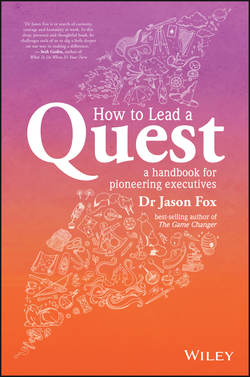Читать книгу How To Lead A Quest - Fox Jason - Страница 8
На сайте Литреса книга снята с продажи.
Part I
Default Thinking and the Kraken of Doom
1
The Anatomy of Default Thinking
PATTERNS
ОглавлениеFrom the moment we are born, we start to recognise patterns – those discrete, discernible and repeatable experiences. Every such experience we observe is encoded to inform our model of how the world works.
Indeed, the linguistic roots of the word ‘pattern' come from the Old French word ‘patron' – the idea being that this patron serves as a model or example to be copied. I love linguistics.
The more frequently we experience or observe particular phenomena, the stronger this encoding becomes. It's why we train for sport, and practise mathematics, music and language. Without this incredible ability to recognise patterns, we would never learn anything. We wouldn't even know how to communicate. In fact, our ability to recognise and codify patterns to form our own model of the world could arguably be a cornerstone of our existence. #profound
And all this pattern recognition is automatic: by just observing and experiencing the world around you, you are codifying new patterns or reinforcing existing ones.
From a very young age, for example, we're picking up objects and then dropping them. We observe a repeatable pattern, learn it, and are eventually given a label for it – ‘gravity'. Likewise, we learn about our preferences through our experiences. I commonly order my default coffee preference at a cafe, without even thinking about it. Sure, some fancy new single origin may be on the menu, but I'd need to be aware and mindful to look for it first.
Many of us experience the phenomena of pattern recognition and default thinking when driving (or riding) home from work. If you've had a particularly tiring or busy day, or if you have a lot on your mind, the well-encoded pattern of your usual route could have you arriving home without you even truly realising it. Another example is musicians learning new music by studying patterns of input. It's clunky to start with, but with enough repetition (practice), the pattern becomes embedded, and the music can be played without having to actively think about it. Much like riding a bike.
Think about a software developer writing code for a program. If they have diverse experience, chances are, when confronted with new challenges, they can quickly call upon a rich database of potential solutions. On the other hand, a less experienced coder would need to invest more time to experiment with and explore the efficacy of new patterns, in order to find a solution.
Our memory is a database for such patterns. It stores patterns contextually, and is optimised for speed. This speed allows us to take the cognitive shortcuts that enable us to draw conclusions quickly. And the more experience we've had – the more patterns we have observed – the more cognitive shortcuts we have at hand.
But this speed comes at a cost – accuracy. Despite what we may think, our memory is often an inaccurate source of information, influenced as it is by myriad factors – such as our emotional (psychophysiological) state, time elapsed since we recognised the pattern and our current context.5 This means that many of the patterns we call upon to inform our default thinking may be inaccurate in any given context or moment – or even no longer valid or relevant in this new context. Thus, without challenging our own default thinking, we may be proceeding with flawed assumptions.
Default thinking is not the result of consideration or any form of reasoned, intuitive or active thought. It takes effort to draw awareness to the potential inaccuracies or inherent biases within our thinking. Such effort is confronting, and slows down the cognitive process and decision-making, running counter to the efficiency and productivity we need for most of our work.6
Of course, it would simply be infeasible to engage in slow, deep and thorough thinking for every facet of business – we'd get nothing done. It'd be silly to go back to the drawing board when attempting any new task.
And so systems are created to help us to manage increasingly complex patterns of work.
5
Not to mention a swag of cognitive biases (see chapter 14).
6
You may have already suspected this, but I'm setting up ‘default thinking' to take a fall. Don't get me wrong – it is utterly brilliant for 80 per cent of our work.* If you're looking to replicate existing work more efficiently, to simply tick boxes, be productive, get shit done and progress formulaic processes with predictable outcomes, your ability to recognise patterns, take cognitive shortcuts, leverage past experience and run with default thinking is an absolute asset. But – and it's a big but – if you're looking to venture beyond the default, to truly innovate and pioneer into uncharted territory, you need to 'ware the perils of our default thinking, lest we meet the Inevitable Kraken of Doom.
* Where did I get this figure from? Not research. It just seems ‘about right' – I essentially defaulted to the Praeto principle, which states that (for most events) roughly 80 per cent of the effects come from 20 per cent of the causes. And why did I do this? Because it serves as a good reference point. And that's what default thinking can be, if we can heighten ourselves to see it: a reference point for decision-making. But not the only reference point.
